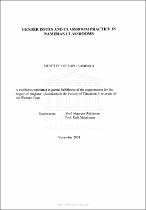Gender issues and classroom practice in Namibia classrooms
Abstract
This study investigates the extent to which sexist practices and gender bias are evident in particular Namibian school classrooms. The investigation was carried out at a Combined school in the Ondangwa West Region of Northern Namibia. It focuses on the question of
whether teachers hold stereotypical views about the learners they teach and whether teachers can explain what they say and do to girls and boys based on gender.
The investigation used observation of classroom and lesson proceedings, as well as group and individual interviews with Grades 5-7 teachers who teach selected subjects. Observations and interviews focused on soliciting teachers' views and perceptions of their learners in terms of academic performance, characteristics and behaviour. The data was analysed around common themes from the group interviews, individual
interviews and classroom observation.
The study found that teachers at this school hold gender stereotypical views of the learners. Through the tasks they give to learners and how they expect such tasks to be carried out, teachers unconsciously reinforced gender stereotypes. The stereotypes they held about their learners determined the treatment and the nature of the interactions with them. The study concluded with the argument and a recommendation that educating teachers intensively through in-service training initiatives is one of the most important ways to mentor them to act toward a sexism-free classroom environment. Classroom activities should be a way to empower girls and positively influence them to pick up their position in modern society in which a woman's role is changing

